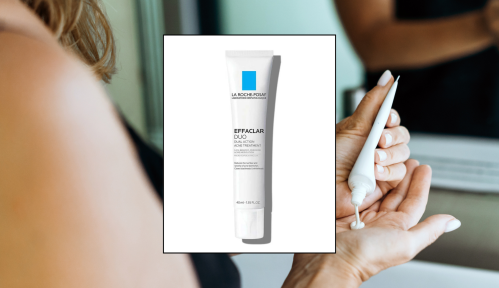By now, you may have heard about the recall of La Roche-Posay’s Effaclar Duo Dual Action Acne Treatment. (If not, heads up.) The U.S. Food and Drug Administration (FDA) released an alert on Tuesday about a “limited number of recalls” of certain products that are contaminated with benzene, a compound linked to cancer, and this popular acne treatment was in the mix.
Experts in This Article
associate professor of pharmacology and toxicology at Michigan State University.
Several products were impacted by this recall, including a specific lot of Effaclar Duo (MYX46W, with an expiration date of April 2025). As the alert explains, independent testing initiated by the FDA detected “elevated levels” of benzene in these products, all of which contain the popular acne treatment benzoyl peroxide. Because of this, stores have been asked to remove Effaclar Duo and other impacted products with certain expiration dates from shelves, including:
- Walgreens Acne Control Cleanser (Exp. September 2025)
- Walgreens Tinted Acne Treatment Cream (Exp. March 2026)
- Proactiv Emergency Blemish Relief Cream Benzoyl Peroxide 5% (Exp. October 2025)
- Proactiv Skin Smoothing Exfoliator (Exp. July 2025)
- SLMD Benzoyl Peroxide Acne Lotion (Exp. March 2025)
But here's where things get interesting: While the FDA has issued the recall, it has not necessarily told customers to stop using the impacted products, including Effaclar Duo. That's because “even with daily use of these products for decades, the risk of a person developing cancer because of exposure to benzene found in these products is very low,” the alert reads.
The Centers for Disease Control and Prevention (CDC) says benzene is an organic compound and a known carcinogen, meaning it could cause cancer. But it's only long-term exposure to large amounts of the substance that is associated with an increased risk of things like leukemia (a type of blood cancer) and other blood disorders. More specifically, benzene overexposure can cause bone marrow to produce fewer red blood cells, leading to a condition called anemia, and can damage both antibodies and white blood cell count, which may negatively affect your immune system1.
While this information is understandably concerning, especially if you've been using an acne medication impacted by the recall, there is a little more to note about this situation that may reassure you.
First, La Roche-Posay did not put benzene in its product, and the company didn’t really do anything wrong here. Turns out, “anything with benzoyl peroxide can contain benzene, because that is one of the break-down products,” or the result of larger substances being broken down into a smaller, simpler substance, Jamie Alan, PhD, an associate professor of pharmacology and toxicology at Michigan State University, tells Well+Good. This process can just happen naturally after a product is made.
In this case, benzene may have formed naturally after the Effaclar Duo was made, while it was in transit, or while it was sitting in storage. “The level of benzene can increase with improper storage [of products], specifically high temperatures,” Dr. Alan adds.
Ultimately, Dr. Alan agrees with the FDA’s assessment that you don’t need to be alarmed if you’ve been using Effaclar Duo to treat your acne. “Don’t panic,” she says. Of course, if you're particularly concerned, she recommends you stop using the product out of an abundance of caution.
So far, no other batches of Effaclar Duo have been impacted. So, if you like this acne treatment and feel like it works well for you, you're fine to keep on using it in the future.
- Snyder, Robert. “Leukemia and benzene.” International journal of environmental research and public health vol. 9,8 (2012): 2875-93. doi:10.3390/ijerph9082875 ↩︎
Sign Up for Our Daily Newsletter
Get all the latest in wellness, trends, food, fitness, beauty, and more delivered right to your inbox.
Got it, you've been added to our email list.










